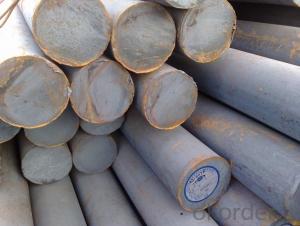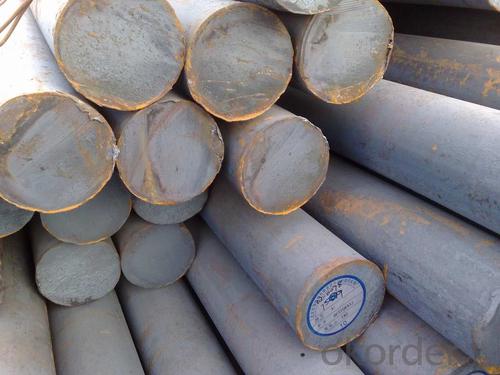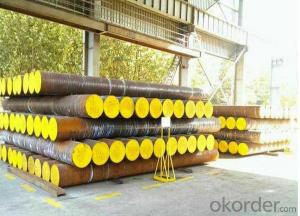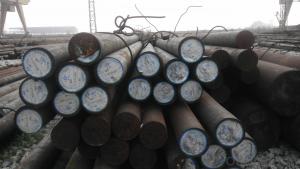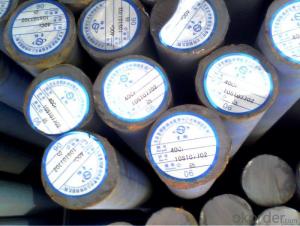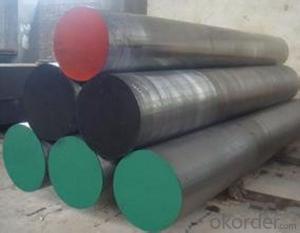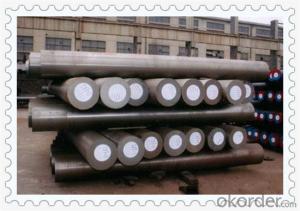Special Steel 1.7225 Steel Round Bar / SCM440 Round Bar
- Loading Port:
- China main port
- Payment Terms:
- TT or LC
- Min Order Qty:
- 25 m.t.
- Supply Capability:
- 10000 m.t./month
OKorder Service Pledge
OKorder Financial Service
You Might Also Like
Specification
The details of our Steel
1. Produce Standard: as the GB, AISI, ASTM, SAE, EN, BS, DIN, JIS Industry Standard
2. Produce processes: Smelt Iron -EAF smelt Billet - ESR smelt Billet -Hot rolled or forged get the steel round bar and plate
3. Heat treatment:
Normalized / Annealed / Quenched+Tempered
4. Quality assurance:
All order we can received Third party inspection, You can let SGS, BV,.. and others test company test and inspect our products before Goods shipping.
Product information
Chemical Composition(%) of SCM440 round bar | C | Si | Mn | P | S | Cr | Mo |
0.38-0.45 | ≤0.40 | 0.60-0.90 | ≤0.035 | ≤0.035 | 0.90-1.20 | 0.15-0.30 | |
Specification of SCM440 round bar | Hot Rolled: Dia.(mm)*L(mm)=14-20*2000-6000 | ||||||
Forged: Dia.(mm)*L(mm)=210-800*2000-6000 | |||||||
Application of SCM440 round bar | (1) unibody electrical and electronic mold; (2) plastic mould and die holders; (3) making main shaft of streamer, bolt for 400°C; (4) making the hammer stem and aggravating drill pipe. | ||||||
Characteristic of SCM440 round bar | (1) High strength and toughness; (2) Good hardenability and the quenching deformation is small; (3) Good processability and easy polishing; (4) Easy texture and platable; (5) The strength and section are bigger than 35CrMo(4135). | ||||||
Heat Treatment of SCM440 round bar | Forging:1100~900°C Normalization:860~880°C Subcritical Annealing:680~720°C Isothermal Annealing:830~900 670x3h°C Hardening:830~860 oil Tempering:550~650°C | ||||||
Mechanical Property of SCM440 round bar | Rm(MPa): 1080 Re(MPa): 930 Ae%: 12 Z%: 45 A(S): 63 | ||||||
Delivery Condition of SCM440 round bar | hot rolled, black surface, annealed | ||||||
Payment Term of SCM440 round bar | L/C,T/T,30% in advance,70% before the shipment | ||||||
Main product
High speed steel | |
AISI | M2,M4,M35,M42,T1 |
DIN | 1.3343,1.3243,1.3247,1.3355 |
JIS | SKH51,SKH54,SKH35,SKH59,SKH2 |
Cold work tool steel | |
AISI | D2,D5,D3,D6,A8,A2,O1 |
DIN | 1.2379,1.2601,1.2080,1.2436,1.2631,1.2363,1.2510,1.2327 |
JIS | SKD10,SKD11,SKD1,SKS3 |
Hot work tool steel | |
AISI | H13,H11,H21 |
DIN | 1.2344,1.2343,1.2367,1.2581,1.2713 |
JIS | SKD61,SKD6,SKD7,SKD5SKT4 |
Plastic mould steel | |
AISI | P20,P20+Ni,420 |
DIN | 1.2311,1.2738,1.2083,1.2316 |
JIS | PDS-3,SUS420J1,SUS420J2 |
Alloy structural seel | |
AISI | 5140,4340,4135,4140 |
DIN | 1.7035,1.6511,1.7220,1.7225 |
JIS | SCr440,SNCM439,SCM435,SCM440 |
Stainless steel | |
AISI | 440C,420,430 |
DIN | 1.4125 |
JIS | SUS440C |
Carbon steel | |
AISI | 1045,1020 |
DIN | 1.1191 |
JIS | S45C, G3101 |
Product show

Workshop show

Shipping
1. FedEx/DHL/UPS/TNT for samples, Door-to-Door;
2. By Air or by Sea for batch goods, for FCL; Airport/ Port receiving;
3. Customers specifying freight forwarders or negotiable shipping methods!
Delivery Time: 3-7 days for samples; 5-25 days for batch goods.
Payment Terms
1.Payment: T/T, L/C, Western Union, MoneyGram,PayPal; 30% deposits; 70% balance before delivery.
2.MOQ: 1pcs
3.Warranty : 3 years
4.Package Informations: 1) EXPORT, In 20 feet (GW 25 ton) or 40 feet Container (GW 25 ton)
2)as customer's requirement
Why choose us?
(1) The leading exporter in China special steel industry.
(2) Large stocks for various sizes, fast delivery date.
(3) Good business relationship with China famous factories.
(4) More than 7 years steel exporting experience.
(5) Good after-sales service guarantee.
- Q: What are the different methods of preventing intergranular corrosion in special steel?
- Various techniques are available for preventing intergranular corrosion in special steel. 1. Heat Treatment: A highly effective approach involves subjecting the steel to solution annealing, a heat treatment process. This method entails heating the steel to a high temperature and rapidly cooling it. By doing so, any precipitates or carbides that may have formed along the grain boundaries are dissolved, thereby reducing the risk of intergranular corrosion. 2. Alloying: Another strategy is to introduce specific alloying elements into the steel composition. For instance, the addition of elements such as chromium and molybdenum can enhance the steel's resistance to intergranular corrosion. These alloying elements create a protective oxide layer on the surface, preventing corrosion along the grain boundaries. 3. Passivation: Passivation involves treating the steel surface with chemicals that establish a protective layer. This layer acts as a barrier, safeguarding the grain boundaries from the corrosive environment. Common passivation techniques include acid pickling and electrochemical methods. 4. Sensitization Control: Particular attention must be given to controlling the sensitization process. Sensitization occurs when the steel is exposed to high temperatures for an extended period, resulting in the precipitation of chromium carbides along the grain boundaries and rendering the steel vulnerable to intergranular corrosion. By carefully controlling the heating and cooling rates during processing, sensitization can be minimized or prevented. 5. Corrosion Inhibitors: Another option is the utilization of corrosion inhibitors, which are chemicals that can be applied to the steel surface to protect it from corrosion. These inhibitors form a protective film on the surface, preventing corrosive agents from attacking the grain boundaries. It is important to consider that the choice of method depends on the specific type of special steel and its intended application. Selecting the most suitable approach requires a comprehensive understanding of the steel's composition, processing conditions, and the expected corrosive environment.
- Q: How does special steel contribute to improving product reliability?
- Special steel contributes to improving product reliability in several ways. Firstly, special steel is known for its exceptional strength and durability, making it less prone to wear and tear or structural failures. This enhanced strength ensures that products made with special steel can withstand heavy loads, extreme temperatures, and harsh working conditions, thereby increasing their reliability and lifespan. Additionally, special steel is often engineered to have superior resistance to corrosion, rust, and other forms of degradation, minimizing the risk of damage or malfunction due to environmental factors. Moreover, the precise composition and manufacturing processes used in special steel production enable tighter tolerances and improved dimensional accuracy, resulting in products that fit together more seamlessly and function with greater precision. Overall, the use of special steel in various industries helps to enhance product reliability, ensuring that customers can trust in the quality and performance of the end products they use.
- Q: How does special steel contribute to reducing greenhouse gas emissions?
- Special steel can contribute to reducing greenhouse gas emissions in several ways. Firstly, it can be used in the manufacturing of more energy-efficient vehicles, which emit lower levels of carbon dioxide during operation. Additionally, special steel can be utilized in the production of renewable energy infrastructure, such as wind turbines and solar panels, which helps reduce reliance on fossil fuels. Furthermore, special steel is often employed in the construction of energy-efficient buildings, which require less energy for heating and cooling, thus lowering overall emissions. Overall, the use of special steel in various applications plays a significant role in the reduction of greenhouse gas emissions and the transition to a more sustainable future.
- Q: How does special steel perform in terms of wear resistance?
- Special steel is known for its exceptional wear resistance, making it highly durable and long-lasting even under harsh conditions. It exhibits superior resistance to abrasion, erosion, and impact, allowing it to withstand heavy usage and minimize wear and tear. This characteristic makes special steel an excellent choice for applications where wear resistance is crucial, such as in the manufacturing of tools, machinery, and automotive components.
- Q: How does special steel contribute to the magnetic properties of products?
- Special steel contributes to the magnetic properties of products through its unique composition and structure. Special steel, also known as alloy steel, contains specific elements such as nickel, chromium, manganese, and molybdenum, which alter its magnetic behavior. These elements can enhance or suppress the magnetism of the steel, depending on the desired application. For example, when nickel is added to steel, it increases its magnetic permeability, making it more receptive to magnetic fields. This property is particularly useful in applications like transformers, where the steel core needs to efficiently conduct magnetic flux. Similarly, the addition of other magnetic elements like cobalt or iron can also enhance the magnetic properties of special steel. On the other hand, certain elements can reduce or eliminate the magnetic properties of steel. Chromium, for instance, is known for its anti-magnetic characteristics. By adding chromium to steel, it can decrease its magnetic permeability, making it suitable for applications that require non-magnetic qualities, such as medical equipment or electronics. Furthermore, the structure of special steel also plays a crucial role in its magnetic properties. Through various heat treatment processes, the steel's crystalline structure can be manipulated, affecting its magnetization. For instance, by annealing the steel, the crystal grains can be made larger, reducing its magnetization. Conversely, cold working or quenching the steel can lead to a finer grain structure, enhancing its magnetic properties. In summary, special steel contributes to the magnetic properties of products by incorporating specific elements that either enhance or suppress magnetism, depending on the application requirements. Additionally, the steel's structure can be modified through heat treatments, further influencing its magnetization. The ability to tailor the magnetic properties of special steel makes it a valuable material for various industries, including telecommunications, energy, and electronics.
- Q: How does special steel contribute to the manufacturing of consumer goods?
- Consumer goods manufacturing greatly relies on special steel to enhance the durability, strength, and performance of various products. This type of steel is specifically engineered with unique properties and alloys to meet the demanding standards of the industry. One way in which special steel significantly contributes to consumer goods manufacturing is through its exceptional strength and durability. It forms a solid foundation for products that need to endure heavy use, such as kitchen appliances, power tools, and automotive components. The strength of special steel guarantees that these products can withstand daily wear and tear, resulting in longer lifespans and reduced maintenance costs for consumers. Additionally, the corrosion resistance properties of special steel make it an ideal material for consumer goods exposed to harsh environments or moisture. This is particularly crucial for products like kitchen utensils, cutlery, and bathroom fixtures, as they frequently come into contact with water or corrosive substances. By incorporating special steel, manufacturers can ensure that their products remain free from rust and maintain their aesthetic appeal over time. Furthermore, special steel offers enhanced performance capabilities. For example, it can be utilized in the manufacturing of consumer goods requiring high heat resistance, such as cooking appliances and automotive engine components. Special steel's ability to withstand extreme temperatures without deforming or losing its properties makes it an essential material for these applications. Moreover, the versatility of special steel allows it to be customized to meet specific consumer needs. Manufacturers have a wide range of special steel alloys with varying characteristics to choose from, enabling them to optimize the performance of their products. This flexibility enables the production of personalized consumer goods that meet specific requirements, whether it involves lightweight materials for portable electronics or impact-resistant components for sporting equipment. Overall, special steel plays a vital role in consumer goods manufacturing by providing strength, durability, corrosion resistance, and enhanced performance. Its unique properties contribute to the production of high-quality products that can withstand heavy use, offer extended lifespans, and ensure customer satisfaction.
- Q: How is special steel used in the production of turbine shafts?
- Special steel is used in the production of turbine shafts due to its high strength, durability, and resistance to corrosion and fatigue. The unique properties of special steel make it ideal for withstanding the extreme conditions and loads experienced by turbine shafts during operation, ensuring efficient and reliable power generation.
- Q: What are the different methods for shot peening special steel?
- There are several methods for shot peening special steel, including air blast peening, wheel blast peening, and centrifugal peening. Air blast peening involves directing a stream of shot particles onto the surface using compressed air, while wheel blast peening uses a rotating wheel to propel the shot particles. Centrifugal peening utilizes a spinning wheel to throw the shot particles onto the steel surface. Each method has its own advantages and is used based on the specific requirements of the steel and the desired outcome of the shot peening process.
- Q: What are the main applications of special steel in the mining equipment?
- Special steel is widely used in mining equipment due to its high strength, durability, and resistance to wear, corrosion, and impact. It finds applications in various mining equipment components such as drill bits, crushers, conveyor systems, and grinders. These specialized steels can withstand extreme conditions, enhance productivity, and ensure safety in mining operations.
- Q: Can special steel be used for medical implants?
- Yes, special steel can be used for medical implants.
Send your message to us
Special Steel 1.7225 Steel Round Bar / SCM440 Round Bar
- Loading Port:
- China main port
- Payment Terms:
- TT or LC
- Min Order Qty:
- 25 m.t.
- Supply Capability:
- 10000 m.t./month
OKorder Service Pledge
OKorder Financial Service
Similar products
Hot products
Hot Searches
Related keywords
